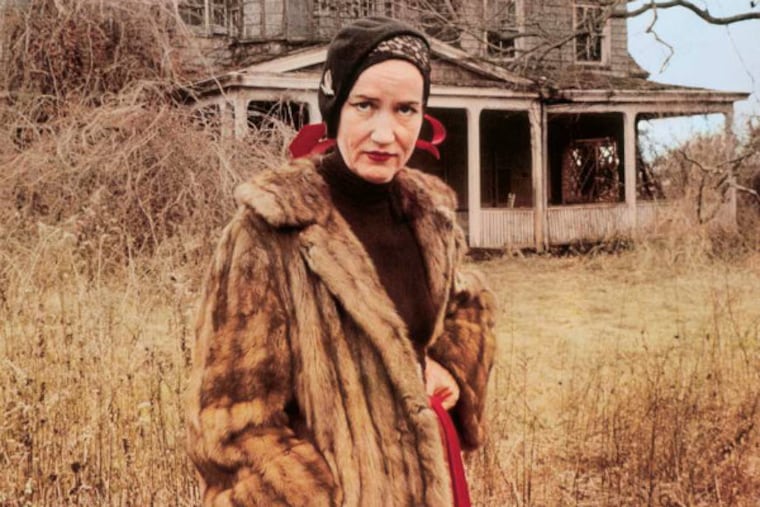'Grey Gardens': Remastered rerelease revisits recluse socialites
'I think this is the best costume for the day." "Little Edie" Bouvier Beale, cousin of Jacqueline Kennedy Onassis and a subject of the Maysles brothers' classic 1975 documentary, Grey Gardens, was describing her outfit. She was wearing pantyhose, a skirt she had pinned together, and a head scarf, peculiar fashions she sported throughout the film. Little Edie liked this look because, if need be, the skirt could be made into a cape.

'I think this is the best costume for the day."
"Little Edie" Bouvier Beale, cousin of Jacqueline Kennedy Onassis and a subject of the Maysles brothers' classic 1975 documentary, Grey Gardens, was describing her outfit. She was wearing pantyhose, a skirt she had pinned together, and a head scarf, peculiar fashions she sported throughout the film. Little Edie liked this look because, if need be, the skirt could be made into a cape.
With that, Little Edie became the patron saint of the weirdo-girl and gay-boy devotees of Grey Gardens, a cinéma vérité, slice-of-life doc about Edie and her mother, "Big" Edie. To mark the film's 40th anniversary, Grey Gardens is being rereleased in a remastered print.
What was it about Little Edie, who flirted mercilessly with the Maysles - Albert, who died in March, and David - as they documented her isolated life in a decrepit Long Island mansion, cooped up with her feeble, overbearing mother?
Despite Little Edie's circumstances - a house overrun by cats, a mother who wouldn't let her truly live - she seemed to thrive on film. Her moods swung, but she was so happy to stand in the spotlight, to receive the attention of these men.
Though her cousin Jackie was the era's picture of female perfection - modest, gorgeous, and classy, Little Edie was the opposite. She was brash, heavily accented, and perma-turbaned because that was how she wanted to look, thank you very much. The headscarves were more to hide her alopecia, though she never let on that they were anything but a fashion choice.
There was an inherent pain beneath Little Edie's persona. She was a prisoner in the East Hampton mansion, unmarried, left to take care of her mother, whom her father abandoned in 1931. Big Edie, sickly and largely confined to bed, is lorded over her daughter, constantly bickering and fighting.
Little Edie certainly had her own eccentricities - to say the least. But her tragedy was being full of a life she was unable to lead.
In these moments, she became an icon for the subset of those who wished to be heard above some oppressive force.
Yet her joy was indelible. In one scene, Little Edie celebrated the Fourth of July with a patriotic flag dance, announced with a homemade sign: "The Great Dancer Little Edie Bouvier Beale." She pranced down the stairs and into the foyer, waving a tiny American flag, mugging for the camera - an odd performance for a grown woman.
She clearly was playing to the Maysles' lens, but Grey Gardens gives you the impression she would have been dancing like this even if no one were watching.
Grey Gardens (rerelease) **** (Out of four stars)
Directed by Albert and David Maysles. With Edith "Little Edie" Bouvier Beale, Edith "Big Edie" Bouvier Beale, Jerry Torre. Distributed by Janus Films.
Running time: 1 hour, 40 mins.
Parent's guide: PG.
Playing at: Ritz at the Bourse.EndText
215-854-5909